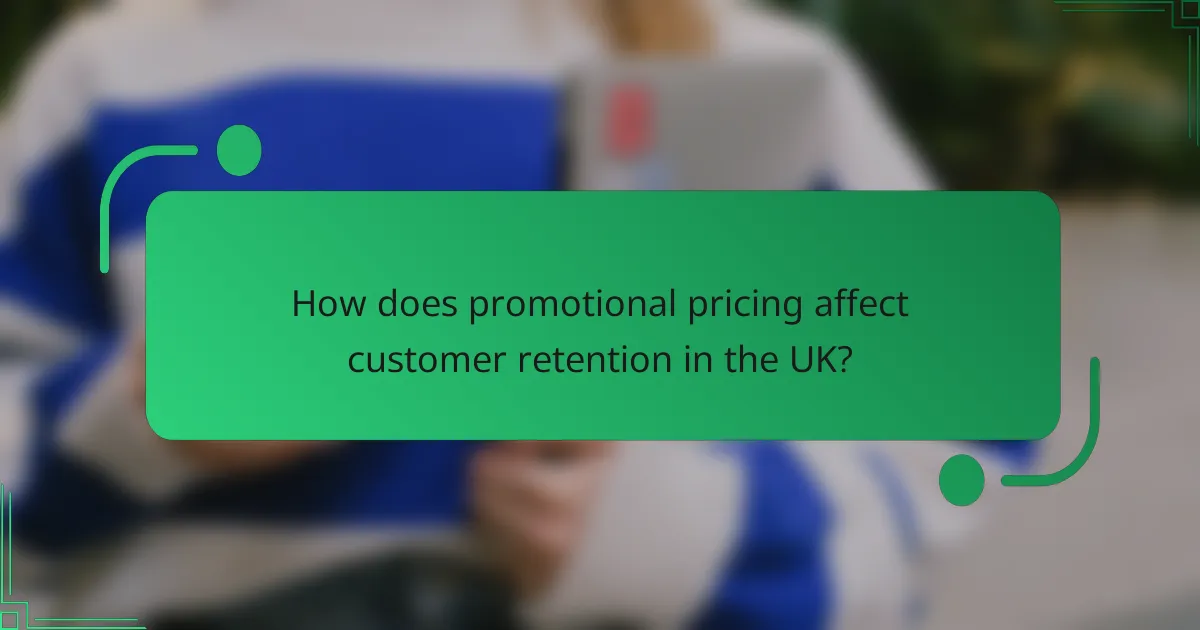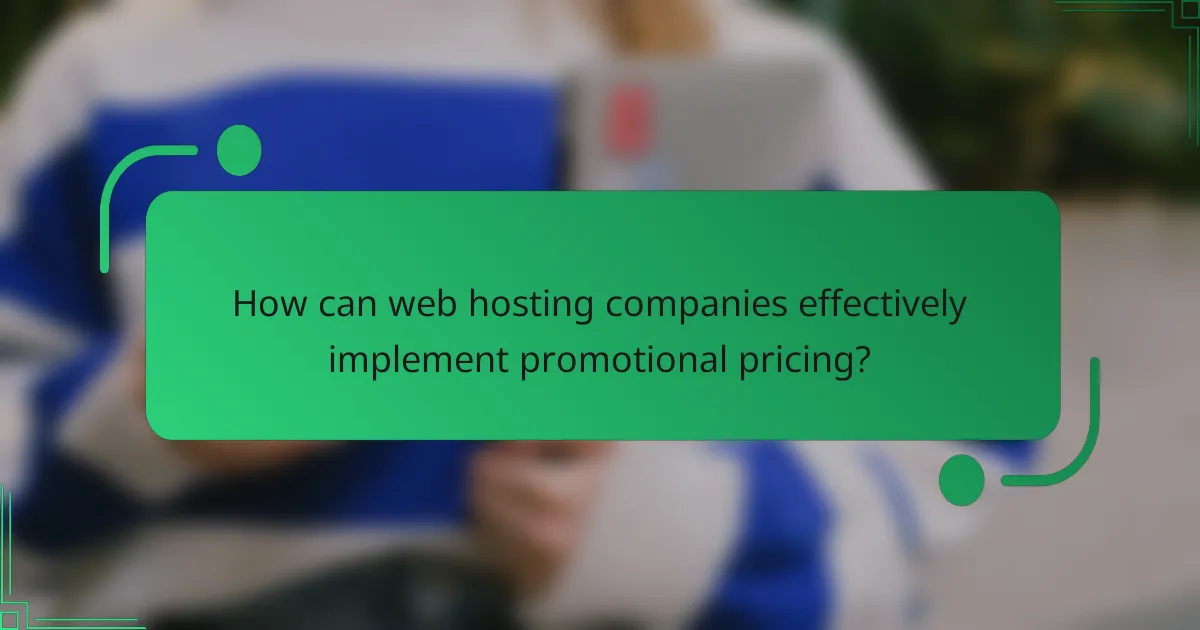Promotional pricing in web hosting serves as a strategic tool to attract new customers and enhance market visibility, ultimately driving sales and fostering customer loyalty. However, it also presents risks such as potential revenue loss and elevated customer expectations, which can affect long-term profitability and brand perception. Understanding these dynamics is crucial for web hosting providers aiming to balance immediate gains with sustainable growth.

What are the benefits of promotional pricing in web hosting?
Promotional pricing in web hosting offers several advantages, including attracting new customers and increasing market presence. These benefits can lead to greater sales and customer loyalty when executed effectively.
Increased customer acquisition
Promotional pricing strategies can significantly boost customer acquisition by lowering the initial cost barrier for new users. For instance, offering a discounted first year can entice individuals or businesses to try a hosting service they might otherwise overlook.
Many web hosting companies implement introductory offers, such as 50% off for the first six months, to attract a larger customer base. This tactic can lead to a rapid increase in sign-ups, especially in competitive markets.
Enhanced market competitiveness
By adopting promotional pricing, web hosting providers can enhance their competitiveness against rivals. Lower prices can make a service more appealing, particularly in saturated markets where numerous options exist.
For example, if a competitor offers a similar service at a standard rate, a promotional price can position a company as a more attractive choice, potentially capturing a larger share of the market.
Boosted brand awareness
Promotional pricing can effectively boost brand awareness as customers share their positive experiences with discounted services. When users perceive they are getting a good deal, they are more likely to recommend the service to others.
Additionally, marketing campaigns highlighting promotional offers can increase visibility, drawing attention to the brand and its offerings, which can lead to organic growth through word-of-mouth referrals.
Encouragement of long-term subscriptions
Promotional pricing can encourage customers to commit to long-term subscriptions by offering significant savings for multi-year plans. For instance, a hosting provider might offer a substantial discount for a three-year commitment compared to monthly billing.
This strategy not only secures revenue for the provider but also fosters customer loyalty, as users are more likely to stick with a service they have invested in for an extended period. However, it is crucial to ensure that the service quality remains high to retain these customers beyond the promotional period.

What are the risks associated with promotional pricing in web hosting?
Promotional pricing in web hosting can lead to several risks that may impact long-term profitability and customer relationships. These risks include potential revenue loss, heightened customer expectations for discounts, and brand devaluation.
Potential revenue loss
Offering promotional pricing can result in reduced revenue, especially if discounts are significant. For instance, if a web hosting provider offers a 50% discount for the first year, they may struggle to recoup those losses when customers renew at full price. This can lead to a cycle of needing to attract new customers with ongoing promotions, which may not be sustainable.
Providers should carefully assess their pricing strategy to ensure that promotional offers do not erode overall profitability. Regularly reviewing customer acquisition costs versus lifetime value can help maintain a healthy balance.
Customer expectation for discounts
When customers become accustomed to promotional pricing, they may expect discounts on future purchases or renewals. This expectation can complicate pricing strategies, as customers may resist paying full price after experiencing lower rates. For example, a customer who initially signed up for a hosting plan at a discounted rate may feel dissatisfied when faced with standard pricing later.
To mitigate this risk, web hosting companies can implement loyalty programs or offer incremental discounts for long-term customers, rather than relying solely on promotional pricing to attract new clients.
Brand devaluation
Frequent promotional pricing can lead to brand devaluation, as customers may perceive the service as less valuable. If a web hosting provider is constantly offering discounts, it can create a perception that their services are overpriced at regular rates. This can undermine the brand’s reputation and make it challenging to position the service as a premium offering.
To avoid brand devaluation, companies should limit the frequency and depth of promotional offers. Focusing on the unique value propositions of their services can help maintain brand integrity while still attracting customers.

How does promotional pricing affect customer retention in the UK?
Promotional pricing can significantly influence customer retention in the UK by attracting new clients and encouraging existing ones to stay. However, its effectiveness often depends on the perceived value and the long-term pricing strategy following the promotional period.
Short-term customer loyalty
Promotional pricing often leads to short-term customer loyalty as clients are drawn in by attractive offers. For instance, a web hosting provider may offer a substantial discount for the first year, enticing customers to sign up. This initial appeal can create a sense of commitment, but it may not guarantee long-term loyalty if the regular pricing is perceived as too high.
To maintain this loyalty, providers should focus on delivering excellent service and support during the promotional period. Engaging customers through regular communication and offering additional benefits can help reinforce their decision to stay beyond the promotional phase.
Impact on churn rates
Churn rates can be affected by promotional pricing, as customers may leave once the promotional period ends and prices revert to standard rates. If customers feel they are not receiving value for the regular price, they may seek alternatives, leading to increased churn. A well-structured follow-up strategy is essential to mitigate this risk.
Providers can consider implementing loyalty programmes or gradual price increases to ease the transition from promotional to standard pricing. Offering incentives for contract renewals or additional services at a discounted rate can also help retain customers and reduce churn rates in the long run.

What factors influence the longevity of promotional pricing strategies?
The longevity of promotional pricing strategies in web hosting is primarily influenced by market demand fluctuations and changes in the competitive landscape. Understanding these factors can help businesses optimise their pricing tactics for sustained success.
Market demand fluctuations
Market demand fluctuations can significantly impact how long promotional pricing remains effective. When demand is high, hosting companies may maintain lower promotional rates to attract new customers, but as demand decreases, they might need to adjust prices to maintain profitability.
For instance, during peak seasons or major events, demand for web hosting services can surge, allowing companies to offer promotions that entice customers. Conversely, in off-peak periods, they may need to reconsider their pricing strategies to avoid losses.
Competitive landscape changes
Changes in the competitive landscape can also affect the longevity of promotional pricing. If new competitors enter the market with aggressive pricing strategies, existing providers may need to adapt their promotions to remain attractive to consumers.
For example, if a rival offers a significantly lower price for similar services, a web hosting company might have to extend or enhance its promotional pricing to retain customers. Regularly monitoring competitors’ pricing and offerings is crucial for making informed decisions about promotional strategies.

How can web hosting companies effectively implement promotional pricing?
Web hosting companies can implement promotional pricing by offering attractive discounts while ensuring clear communication and targeted marketing. This approach not only attracts new customers but also retains existing ones by providing value and transparency.
Clear communication of terms
Clear communication of promotional pricing terms is essential for building trust with customers. Companies should outline the duration of the promotion, any renewal rates, and specific conditions that apply. For instance, stating that a discount applies for the first year only can prevent misunderstandings later.
Using straightforward language in promotional materials helps customers understand what they are signing up for. Avoiding jargon and being upfront about potential price increases after the promotional period can enhance customer satisfaction.
Targeted marketing campaigns
Targeted marketing campaigns can significantly boost the effectiveness of promotional pricing. By identifying specific customer segments, such as small businesses or freelancers, companies can tailor their messaging to resonate with these groups. For example, offering a special rate for startups can attract new clients looking for cost-effective solutions.
Utilising platforms like social media and email marketing can help reach the intended audience more effectively. Personalised offers based on user behaviour or preferences can increase engagement and conversion rates.
Utilisation of analytics for optimisation
Utilising analytics allows web hosting companies to optimise their promotional pricing strategies. By analysing customer data, companies can identify which promotions are most effective and adjust their offerings accordingly. For instance, tracking conversion rates during different promotional periods can reveal the best times to launch discounts.
Regularly reviewing performance metrics, such as customer acquisition costs and retention rates, can inform future pricing strategies. Companies should be prepared to adapt their promotional pricing based on market trends and customer feedback to maximise their impact.

What are the best practices for managing promotional pricing in web hosting?
Managing promotional pricing in web hosting effectively requires a strategic approach that balances attracting new customers with maintaining profitability. Key practices include regular performance evaluation and integrating customer feedback to refine pricing strategies.
Regular performance evaluation
Regularly assessing the performance of promotional pricing is crucial for understanding its impact on customer acquisition and retention. This involves tracking metrics such as conversion rates, customer lifetime value, and churn rates to gauge the effectiveness of promotions.
Consider setting specific timeframes for evaluation, such as quarterly reviews, to identify trends and adjust strategies accordingly. For example, if a promotion leads to a spike in sign-ups but a high churn rate afterwards, it may indicate that the pricing does not align with customer expectations.
Customer feedback integration
Integrating customer feedback into your promotional pricing strategy can provide valuable insights into customer preferences and perceptions. Surveys, reviews, and direct communication can help identify what customers value most in a hosting service and how they perceive pricing.
Encourage feedback by offering incentives, such as discounts on future services for completing surveys. This approach not only helps refine your promotional offerings but also fosters a sense of loyalty among customers who feel their opinions are valued.

What emerging trends are shaping promotional pricing in web hosting?
Promotional pricing in web hosting is increasingly influenced by competition, customer demand, and technological advancements. Providers are adopting innovative pricing strategies to attract new customers while retaining existing ones, often through limited-time offers and tiered pricing models.
Dynamic Pricing Models
Dynamic pricing models are becoming more prevalent in web hosting, allowing providers to adjust prices based on demand and customer behaviour. This approach can lead to significant savings for customers during off-peak times, but it may also result in higher costs during peak periods. Understanding the timing of these fluctuations can help customers secure the best deals.
Bundled Services
Bundled services are a common trend where web hosting companies offer multiple services at a discounted rate. For instance, a package might include domain registration, SSL certificates, and website builders alongside hosting. This can provide better value for customers, but it’s important to assess whether all bundled services are necessary for your needs.
Long-Term Contracts with Initial Discounts
Many web hosting providers offer significant discounts for long-term contracts, often locking in lower rates for the first year. However, customers should be cautious as renewal rates can increase substantially after the initial period. It’s advisable to read the fine print and calculate total costs over the contract duration to avoid surprises.
Referral and Affiliate Programs
Referral and affiliate programs are gaining traction, incentivising existing customers to recommend services to others. These programs often provide discounts or credits for both the referrer and the new customer, creating a win-win scenario. However, potential customers should ensure they are choosing a service based on quality rather than solely on referral incentives.